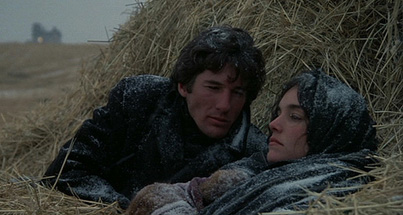Classic Movie Review: Days of Heaven
By Josh Spiegel
September 18, 2009
Days of Heaven looks great. Unfortunately, that and a haunting piece of classical music from Camille Saint-Saens is all that truly sticks out from the film. What's most intriguing is how blatantly obvious it is that most, if not all of the dialogue has been overdubbed so many times, it's almost a joke. Though he is the most recognizable actor now, hearing Richard Gere (as Bill) speak is jarring at best and amateurish at worst. His performance is not bad, but the dubbing of his dialogue is relatively unprofessional. Roger Ebert has accounted for his love of the film by seeing it as viewed completely through the eyes of its narrator, Linda, a somewhat shrewd teenager who never expresses any feelings; she seems to live vicariously through Bill and Abby.
If you buy this argument (and most times, I will buy anything Roger Ebert posits), the film and its awkward dialogue exchanges could be seen as floating in the ether of Linda's mind. Certainly, there is an eerie, ethereal nature about the setting of the film. Its final sequence, set in a small town, with the softly sliding chords of Saint-Saens' "The Carnival of the Animals: Aquarium" in the background, feels like something out of the mind, something not fully real. However, that's about five minutes of a 90-minute movie. Moreover, it's hard to see this film as a success, if it's meant to be a film. Dream or not, it'd be nice if I cared about any of these characters, something that never happened. I was detached from the film at all times; Malick certainly doesn't try to engage the viewer.
So all we're left with is a movie that is more fascinated with itself than we are. Too bad for us; a story with such a complicated love triangle sounds pretty compelling. However, we're meant to guess at everything, left with a narrator who talks with an implacable accent and doesn't give away any information worth knowing, to the maddening and abrupt ending (one that would have done well had it been a minute shorter). Thus, it is fascinating to me that Malick's film is cherished. Yes, the imagery's great, but to what point and purpose?
It's hard to critique the performances from Gere, Shepard, and Adams, who are more visible than Manz, but are blanks, mere statues who, every once in a while, do something as required by the script. At no point was I interested in any of these characters. More than most movies, I wanted to get involved in the story, in the struggles Bill has, but what struggles? I am told at the beginning that Bill is a hothead because he murders someone. Fair point. Moreso, he seems to murder the man for just being a bit of an ass. Yes, but why lie when you get to Texas, Bill? There's no sense in this story. Why does Abby go along with it? Why does Linda go along with it? Doesn't she care about leaving home?
Questions, questions, questions. None of these questions are answered because no one thinks the answers are important. If the answers to these questions aren't important, why are the characters important? Why worry about a script? My final example: the real wrinkle with the love triangle is that Bill initially encourages Abby to get close to the farmer, because the farmer believes he is dying. If the farmer dies, Abby could inherit the land. Suffice to say, things aren't so easy, because the farmer just gets...better. You could argue it's because he's in love, or it's because Malick forgets about this twist. Days of Heaven is a movie that grows more and more frustrating after a first viewing, if only because of the squandered potential.
Continued:
1
2




